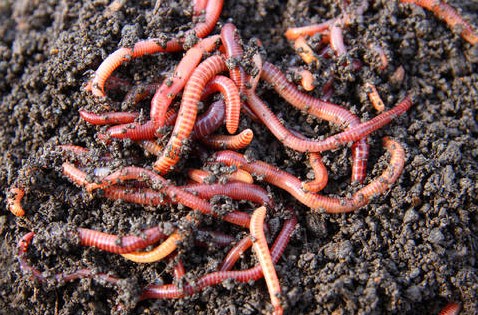
It’s an autumn day in Seattle, but not raining, not cold, and I’m out in my tiny back yard holding a bucket of worm dinner for my pet worms. Pet because they are incarcerated in a large perforated-for-air plastic bin. If I don’t feed them, they die. I worry for my worms. It can be too hot for them, too dry, too wet, too cold.
I remove the plastic lid of their plastic home. My worms are red worms, also called manure worms, Eisenia fetida. They’re pinkish red, wet looking, long as a finger, narrow as a pencil. They wriggle.
Worms like sex. They are hermaphroditic, each one possessing both male and female genitalia. But they do not fertilize themselves. They copulate, each inseminating the other. During sex, worms can cling together for as long as three hours. In his vivid book on earthworms, The Formation of Vegetable Mould Through the Action of Worms with Observations of their Habits, Charles Darwin writes: “Their sexual passion is strong enough to overcome for a time their dread of light.”
Yes. Worms dread light. Their neurons are, in part, photoreceptors. They hate it when I lift their lid. When I remove the black trash bag that covers them, they dive for the dark. Worm dark is the damp dung they make out of garbage—castings.
Worms have no sense of personal space, as far as I can tell. They crawl all over each other, and this is not sexual passion. They must stay damp: a dry worm is a dead worm. This wet business has to do with their origin as marine animals, according to my biology book.
Human garbage is a worm’s gourmet delight. I dump in my bucketload of banana peels, chard ends, onion peels, peach pits, apple cores, potato peels, spinach mush, and old mushrooms. I deny them meat scraps not because they have announced their vegetarian preferences, but because another local species—one I have issues with—loves chicken bones. I am speaking of our bright, persistent, sociable, prolific Norway rat, nemesis of our neighborhood.
About worms, Darwin wanted to know “how far they acted consciously, and how much mental power they displayed.” I want to know what they perceive, what they experience.
Worms breathe through their skins, taking in oxygen, expelling carbon dioxide. Anatomically the worm body is a tube within a tube, and this tube is segmented. My worms are in the phylum annelida—the segmented worms. Call them earthworms. My E. fetida are among 9,000 species of annelids.
My worm box does not stink. It smells a lot like soil.
Because, yes, worms make soil. Aristotle called them the intestines of the earth. Without worms, there would be no trees, no grass, no corn-on-the-cob. There would be no popcorn. (Correction: except in one case, there were trees, there was grass. In northern North America under the ice sheets of the last ice age, earthworms were wiped out. There was more leaf litter and microbial digestion proceeded more slowly.)
But back to the question. What do worms want? They want darkness. They want dampness. They want dinner. They want sex. That’s what they want.

